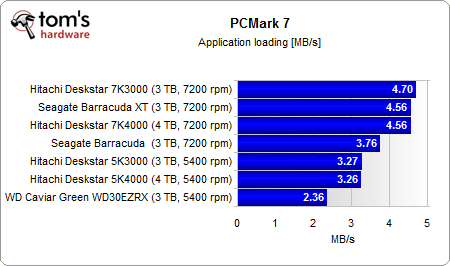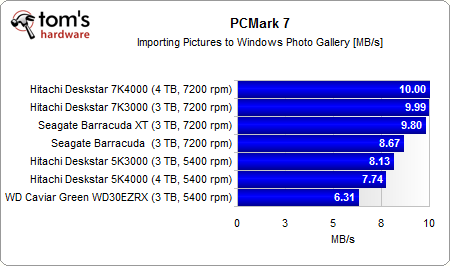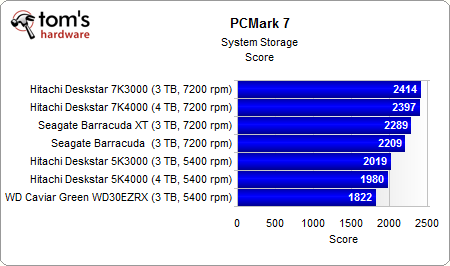Hitachi's 4 TB Hard Drives Take On The 3 TB Competition
Hitachi recently started shipping a pair of 4 TB hard drives. We can see that they're pretty expensive, but how do they compare to existing 3 TB models in other ways? It’s time for a comprehensive overview of today's high-capacity hard drive offerings.
Benchmark Results: PCMark 7
If you simply cannot get your hands on an SSD as a system drive, at least make sure you buy a 7200 RPM disk. You clearly get better application-starting performance than anything a 5400 RPM drive can deliver. Although, once again, adding flash-based storage to the equation is the best way to go.
Get Tom's Hardware's best news and in-depth reviews, straight to your inbox.
Current page: Benchmark Results: PCMark 7
Prev Page Benchmark Results: I/O Workloads Next Page Benchmark Results: Temperature And Power Consumption
Patrick Schmid was the editor-in-chief for Tom's Hardware from 2005 to 2006. He wrote numerous articles on a wide range of hardware topics, including storage, CPUs, and system builds.
-
jsowoc Good review.Reply
Did you encounter any issues with testing drives this large (they need a GPT vs MBR, and booting from them also requires a specific setup)? -
JOSHSKORN I'm curious, can you install Windows 7 x64 to these 4 TB drives and will the full drive be recognized? With the latest motherboards, of course.Reply
At that capacity, why bother with 5400 RPM? -
Darkerson Nice review. I could use a few of those, but until they have more competition and the prices come down, I can wait.Reply -
blackbirden Ony thing i miss from the review is noice level, atleast a subjective one for all who uses them in a htpc or mediastation, do you have any comments on the noice?Reply -
kinggremlin Not sure if there is some sort of pricing glitch going on at Newegg right now, but the Hitachi 7K3000 is currently about $400 plus $7 shipping. That's doesn't sound like the value sweet spot this article mentions multiple times for the 3TB capacities. As also mentioned here, for drives this size, speed is not the be-all-end-all. The $300 Hitachi 5400RPM 4TB drive looks like a much better buy than $407 for a 7K3000.Reply -
Achoo22 I'm pretty disappointed that there aren't multiple points of note regarding expected drive lifetimes, warranties, and return policies in this roundup.Reply
I have had an incredible failure rate with hard drives beginning around the time that the move to perpendicular recording became the norm. I am not alone in this regard. I'm pretty sure that the drive manufacturer's are aware of serious reliability issues, but their RMA policies are ridiculous. I would be willing to pay current market prices for a new drive if vendors stepped up their game with quality control and some appropriate policies addressing data security in the event that a drive is returned - the risk of granting someone else access to my banking, tax information, and whatever else was on the failed drive is generally not worth returning the drive. Vendors know this, and take advantage of it. Until the situation changes, or drives return to their previous rock-bottom sale prices, I will do everything in my power to avoid purchasing more hard drives. -
I have one 3TB Hitachi and several (>20) 2 TBs mixed from Seagate and WD. I'm impressed with 3TB Hitachi drive, and also I'm very disappointed by Seagate which cut their warranties to 1 year. No more Seagate in my home NAS until they improve the offering. Sorry Seagate, I was a Seagate-only user until you screw up with 7200.11, take advantage of the flooding, rised the prices and cut the warranties.Reply
-
Achoo22 blackbirdenOny thing i miss from the review is noice level, atleast a subjective one for all who uses them in a htpc or mediastation, do you have any comments on the noice?There hasn't been a truly loud hard drive on the market for many years. It shouldn't be an issue.Reply -
outlw6669 Achoo22There hasn't been a truly loud hard drive on the market for many years. It shouldn't be an issue.My Hitachi 2TB drives beg to differ.Reply
When they start chugging along, it sounds like a snow plow clearing a parking lot in my room :( -
jacknoll If someone could clear up this thing for me:Reply
I see two parameters for each drive: The media transfer speed and the I/O performance. The first one sounds like the speed to read/write to the disk. AFAIK, it's the speed at which the drive actually reads/writes bits to/from the surface of the platter. In that case, what does the I/O performance mean? It sounds really similar to read/write, but reading these reviews, I get the feeling there's more to I/O.
Thanks.


